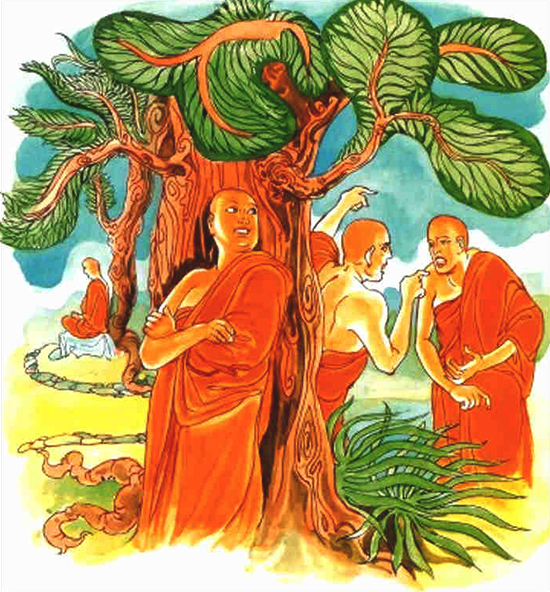Verse 163: It is easy to do things that are bad and unbeneficial to oneself, but it is, indeed, most difficult to do things that are beneficial and good.
The Story of Schism in the Order
While residing at the Veluvana monastery, the Buddha uttered Verse (163) of this book, with reference to Devadatta, who committed the offence of causing a schism in the Order of the bhikkhus.
On one occasion, while the Buddha was giving a discourse in the Veluvana monastery, Devadatta came to him and suggested that since the Buddha was getting old, the duties of the Order should be entrusted to him (Devadatta); but the Buddha rejected his proposal and also rebuked him and called him a “spittle swallowor” (Khelasika). From that time, Devadatta felt very bitter towards the Buddha. He even tried to kill the Buddha three times, but all his attempts failed. Later, Devadatta tried another tactic. This time, he came to the Buddha and proposed five rules of discipline for the bhikkhus to observe throughout their lives.
He proposed:
(i) that the bhikkhus should live in the forest;
(ii) that they should live only on food received on alms-rounds;
(iii) that they should wear robes made only from pieces of cloth collected from rubbish heaps;
(iv) that they should reside under trees; and
(v) that they should not take fish or meat.
The Buddha did not have any objections to these rules and made no objections to those who were willing to observe them, but for various valid considerations, he was not prepared to impose these rules of discipline on the bhikkhus in general.
Devadatta claimed that the rules proposed by him were much better than the existing rules of discipline, and some new bhikkhus agreed with him. One day, the Buddha asked Devadatta if it was true that he was trying to create a schism in the Order, and he admitted that it was so. The Buddha warned him that it was a very serious offence, but Devadatta paid no heed to his warning. After this, as he met Thera Ananda on his alms-round in Rajagaha, Devadatta said to Thera Ananda, “Ananda, from today I will observe the sabbath (Uposatha), and perform the duties of the Order separately, independent of the Buddha and his Order of bhikkhus.” On his return from the alms-round, Thera Ananda reported to the Buddha what Devadatta had said.
On hearing this, the Buddha reflected, “Devadatta is committing a very serious offence; it will send him to Avici Niraya. For a virtuous person, it is easy to do good deeds and difficult to do evil; but for an evil one, it is easy to do evil and difficult to do good deeds. Indeed, in life it is easy to do something which is not beneficial, but it is very difficult to do something which is good and beneficial.”
Then the Buddha spoke in verse as follows:
Verse 163: It is easy to do things that are bad and unbeneficial to oneself, but it is, indeed, most difficult to do things that are beneficial and good.
Then, on the Uposatha day, Devadatta, followed by five hundred Vajjian bhikkhus, broke off from the Order, and went to Gayasisa. However, when the two Chief Disciples, Sariputta and Moggallana, went to see the bhikkhus who had followed Devadatta and talked to them they realized their mistakes and most of them returned with the two Chief Disciples to the Buddha.
Dhammapada Verse 163
Samghabhedaparisakkana Vatthu
Sukarani asadhuni
attano ahitani ca
yam ve hitanca sadhunca
tam ve paramadukkaram.
Source: Tipitaka








Add a comment